Irritable Bowel Syndrome and Endometriosis

Irritable bowel syndrome and endometriosis often occur together.
It is widely recognized that irritable bowel syndrome (IBS) and endometriosis often co-occur, particularly in women with endometriosis, who are more susceptible to developing IBS compared to those without this condition. While the exact origins of both disorders remain elusive, they share common contributing factors.
The interconnection between these conditions may be attributed to the influence of endometriosis lesions on the intestinal mucosa or the intestines themselves, which can lead to digestive issues. Importantly, even when endometriosis does not directly affect the intestines, IBS remains prevalent among individuals with endometriosis [5]. Notably, dietary choices can play a significant role in providing relief. Proper nutrition has been shown to alleviate pain, inflammation, and other symptoms associated with endometriosis, and this insight extends to IBS, suggesting that a suitable diet could offer similar relief. An excellent example is the “low-FODMAP” diet, a widely recognized approach for managing IBS symptoms.
Defining Irritable Bowel Syndrome (IBS)
Irritable bowel syndrome (IBS) is a highly prevalent gastrointestinal disorder in Germany, affecting approximately 14% of the global population [8]. Its etiology is complex and often arises from a combination of factors. These factors include disruptions in the intestinal microbiota, underlying medical conditions, surgical interventions, psychological triggers, medication effects, dietary imbalances, and even conditions such as endometriosis. While irritable bowel syndrome can cause significant discomfort, it is fortunately not life-threatening. Its range of symptoms includes:
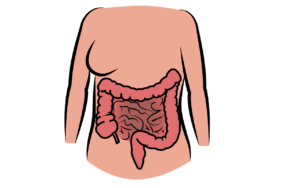
Everyday life with irritable bowel syndrome is marked by a range of digestive challenges.
- Diarrhea
- Flatulence and a sensation of abdominal bloating
- Urgency in the need to defecate
- Constipation
- Abdominal pain
Notably, these symptoms frequently manifest or intensify during periods of increased stress.
Essential Diagnoses for Irritable Bowel Syndrome

A doctor must diagnose irritable bowel syndrome to rule out other issues.
Both irritable bowel syndrome and endometriosis share a common challenge: they are often diagnosed belatedly. In some instances, the diagnosis of irritable bowel syndrome can take precedence, concealing the presence of underlying endometriosis. Many individuals dealing with irritable bowel syndrome initially suspect entirely different conditions as the root cause, highlighting the need for medical professionals to approach the diagnosis of irritable bowel syndrome systematically, ruling out other potential sources of digestive distress.
Blame is frequently placed on dairy products as the culprits for IBS symptoms. However, a closer examination often reveals that lactose intolerance is the true culprit rather than irritable bowel syndrome. This distinction requires clear clarification by a qualified medical practitioner. Moreover, other sensitivities such as milk protein intolerance or allergy, as well as intolerances to fruit sugars (fructose) or gluten (celiac disease), and other dietary sensitivities or inflammatory bowel diseases like Crohn’s disease or ulcerative colitis, could be lurking behind these symptoms. The bottom line is that the diagnosis of irritable bowel syndrome requires the expertise of a medical professional.
Origins of Irritable Bowel Syndrome
The development of irritable bowel syndrome is intricately tied to each individual’s unique circumstances. A single definitive cause or a universal solution for many complaints remains elusive. While psychosomatic triggers are often considered, even minor instances of intestinal mucosa inflammation or disruptions in the delicate intestinal microbiota can serve as precursors to IBS. It is important to note that triggers extend to include endometriosis, which can induce alterations within the intestinal mucosa.
Addressing Irritable Bowel Syndrome and Endometriosis
Therapeutic Approaches for Irritable Bowel Syndrome
Once a definitive diagnosis of IBS has been made, with other digestive tract disorders excluded, the doctor can recommend supportive medications. These medications primarily aim to alleviate symptoms, targeting issues such as flatulence and abdominal cramping. However, it is essential to recognize that these medications provide symptomatic relief and do not directly address the underlying cause. Therapeutic strategies for IBS are founded on 2 key pillars:
- Stress Management and Relaxation Techniques
- Nutrition
There is no one-size-fits-all solution. Patients are encouraged to explore various methods, often a combination of several, to determine what is most effective for their unique circumstances.
The Significance of Nutrition: A Vital Pillar
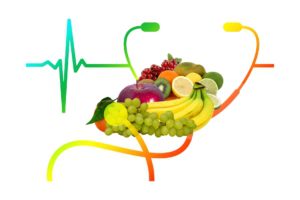
Proper nutrition is an essential component of therapy.
Diet plays a pivotal role in alleviating symptoms associated with both IBS and endometriosis. Explore how a tailored endometriosis diet can help relieve pain, reduce inflammation, and improve overall well-being by exploring “Diet for Endometriosis.” If you are dealing with the dual challenges of irritable bowel syndrome and endometriosis, it is advisable to complement your prescribed diet with recommendations from the “low FODMAP” diet [1].
Recognizing that each digestive system responds uniquely is crucial. It is essential to understand that not all intestines react the same way to every type of food. The value of a diverse and balanced diet is clear, as its benefits outweigh its limitations. When exclusions from the diet increase, the risk of malnutrition also rises. A highly restrictive diet can hinder the absorption of essential nutrients, minerals, vitamins, and trace elements, putting overall well-being at risk. Rigorous dietary regimens can lay the foundation for subsequent health complications due to inadequate nourishment.
Reducing the Risk of Malnutrition
As a result, it is crucial to emphasize the importance of personalized assessment when considering our recommendations. For example, some individuals with irritable bowel syndrome may tolerate dairy products well, while others may not. Avoiding foods solely based on a generic exclusion list is unnecessary if they do not adversely affect you personally. Identifying what should be on your individual “exclusion list” takes time and self-reflection, as it is a journey tailored to your specific needs and responses.
The Path to Success: Self-Observation and Experimentation

A diet diary is a practical companion.
The process involves a systematic approach to exclude specific foods from your diet for 4 to 6 weeks, followed by a gradual reintroduction, one food at a time. Simultaneously, maintaining a diary to record your symptoms is invaluable for tracking your progress over time. This careful practice empowers you to confidently determine which foods may trigger discomfort and to what extent. It also provides insights into the quantity threshold that leads to such discomfort. Notably, portion size often plays a significant role: while a single apple might be manageable, a glass of apple juice or a large bowl of apples might not sit as well. By methodically following this path, you can avoid the risks of overly restrictive dietary measures that may lead to malnutrition.
Balancing Nutrition and Avoiding Malnutrition: A Practical Guide
Surprisingly, the low FODMAP diet has proven effective in around 75% of cases of irritable bowel syndrome, offering a ray of hope [8]. Furthermore, this dietary approach has relieved individuals grappling with intestinal discomfort related to endometriosis. Symptoms like abdominal pain and bloating diminish, bringing about normalized bowel movements [6].
Understanding FODMAPs
FODMAP stands for “Fermentable Oligo-, Di-, Monosaccharides And Polyols,” referring to specific types of carbohydrates and sugar alcohols that can cause digestion challenges. In simpler terms, it includes fermentable polysaccharides, disaccharides, monosaccharides, and polyhydric alcohols. As a result, foods rich in FODMAP should be consumed cautiously by those dealing with IBS [1]. These foods include:
- Lactose (milk sugar)
- Fructose (fruit sugar)
- Xylitol and sorbitol (derived from fruits and used as sweeteners)
- Oligosaccharides (e.g., bread with underdeveloped dough)
The essence of the low FODMAP diet revolves around a significant reduction or complete avoidance of foods rich in these components. It is essential to understand that this diet does not label these foods as inherently unhealthy; instead, they are often implicated in IBS-related complaints. Therefore, symptom relief is achieved through a measured approach, where these foods are consumed in moderation [4]. Notably, the benefits of a low-FODMAP diet extend beyond IBS, as it has also been shown to alleviate digestive symptoms associated with endometriosis.
1. Lactose: Dairy Products and Disaccharide Sugar
Lactose, often called milk sugar, is the natural sugar in animal milk. The enzymatic digestion of lactose depends on the presence of lactase, an enzyme that is unfortunately absent in some individuals, leading to a condition known as lactose intolerance. In cases of irritable bowel syndrome, disruptions in the production of this enzyme can occur, emphasizing the importance of avoiding lactose for some.

Lactose-free or plant-based dairy products frequently contribute to alleviating irritable bowel syndrome symptoms.
However, not all dairy products contain the same amount of lactose due to the changes that occur during their creation and processing. As dairy products age, their lactose content decreases. For example, fresh cow’s milk contains up to 5% lactose, while fresh cheese contains approximately 2%. Long-aged cheeses, on the other hand, have only about 0.1%, making them nearly lactose-free. It is important to note that while cheese breaks down lactose during the ripening process, it simultaneously accumulates histamine, which can, unfortunately, exacerbate pain in cases of endometriosis.
In the context of irritable bowel syndrome and endometriosis, even though hard cheeses have minimal lactose content, they should be avoided due to the histamine issue. Lactose-free or plant-based milk alternatives are preferable choices, readily available in the market. It is worth mentioning that for individuals concerned about endometriosis, plant-based milk alternatives should be fortified with calcium to address potential deficiencies.
2. Fructose (Monosaccharose)
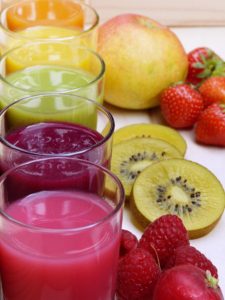
Fruits are generally considered healthy, but not all varieties are equally advisable for managing irritable bowel syndrome.
Contrary to its name, fructose is not exclusive to fruits; it is also found in vegetables—generally, the sweeter the vegetable, the higher its fructose content. For example, carrots, peppers, sweet potatoes, and corn have notable fructose levels – carrots, notably, contain fructose levels similar to peaches. Moreover, distinctions exist within the fruit category as well. Pome fruits like apples, pears, and plums have notably high fructose levels, as do certain berries and tropical fruits like bananas, kiwi, and pineapples.
However, it is essential to underscore the inherent health benefits of fruits and vegetables, with endometriosis benefiting from their inclusion as symptom alleviators. Fruits are undeniably a vital component of a healthy diet. For more insights, click here. Yet, within the context of irritable bowel syndrome and endometriosis, it is wise to prioritize fruits and vegetables with lower fructose content. This translates to regularly consuming options like currants, watermelon, blueberries, grapefruit, and tangy citrus fruits. Among vegetables, mushrooms, cucumbers, and leafy greens align with this approach.
Be aware of fructose’s presence in unexpected places – particularly in industrially processed foods containing “glucose-fructose syrup.” Labels such as “corn syrup,” “invert sugar syrup,” or “maltose syrup” indicate fructose blends. Even honey, often considered a natural alternative, consists of a combination of fructose, household sugar, and water. Given its implications for irritable bowel syndrome, exercise caution with honey. Similarly, seemingly virtuous options like agave or maple syrup, often touted as “healthier sugar alternatives,” contain sugar mixtures enriched with fructose. In essence, minimizing all forms of sugar remains a favorable approach!
3. Polyols (Sorbitol and Xylitol): Sweeteners
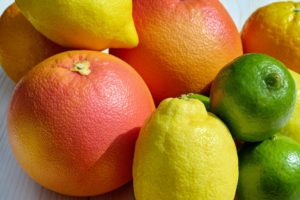
Citrus fruits are highly recommended for irritable bowel syndrome and endometriosis.
Sorbitol and xylitol, commonly known sweeteners, are naturally present in fruits, highlighting their organic origins. Notably, the same fruits mentioned in the context of fructose – stone fruits – contain significant amounts of sorbitol, while citrus fruits have lower levels of this substance. Intriguingly, research has revealed the effectiveness of oranges in alleviating endometriosis symptoms, further endorsing the inclusion of citrus fruits in managing IBS and endometriosis.
However, sorbitol is not confined to fruits; it is also used in producing processed food as a humectant. This includes gingerbread, pastries, biscuits, cakes, and confectionaries such as chocolates or chocolate bars. Some chewing gums also incorporate sorbitol. A wise approach involves avoiding industrially processed foods in favor of homemade alternatives. Additionally, given the symptom improvements observed by avoiding gluten-containing foods in endometriosis, making homemade cakes becomes an optimal solution.
4. Oligosaccharides / Polysaccharides

Industrially produced baked goods can pose digestive challenges due to limited dough resting time.
Oligosaccharides, a diverse group of sugars, are part of the carbohydrate family. They are naturally found in various legumes, such as beans, lentils, and peas. However, their modern journey often involves “industrial bread.” Flour, classified as a complex carbohydrate, undergoes a multifaceted transformation during various processes, ultimately evolving into oligosaccharides.
One transformative pathway involves an intermediate stage in which the carbohydrates in flour undergo fermentation during dough resting, converting into easily digestible simple sugars. However, in industrial processes with shortened dough resting periods, complex carbohydrates lacking the desired simplicity result.
The consequence of this? Oligosaccharides, these complex sugars, present digestion challenges. In stark contrast, traditionally handcrafted bread, nurtured with time and benefiting from the transformative power of sourdough and/or yeasts, becomes free of oligosaccharides and is characterized by ease of digestion. Unfortunately, the contemporary baking landscape, with a scarcity of traditional bakeries, has raised concerns about bread tolerance. For individuals with irritable bowel syndrome, the recommendation leans toward bread made through extended dough resting processes; in the context of endometriosis, choosing bread made from gluten-free flour aligns with health-conscious considerations.
Tips for Managing Irritable Bowel Syndrome and Endometriosis
Strengthening Your Gut Flora
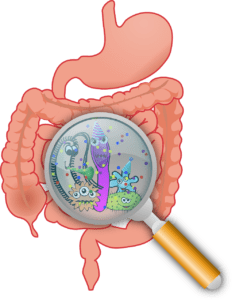
Balanced intestinal flora nurtures digestion, boosts immunity, and supports your well-being.
An optimal balance of gut flora promotes healthy digestion, bolsters the immune system, and contributes to overall psychological well-being.
Low-Irritant Diet for Managing Irritable Bowel Syndrome
In addition to the recommended low FODMAP diet, adhering to a “low irritant” diet is crucial when dealing with IBS [9]. This approach involves avoiding foods that can independently trigger or worsen symptoms. It would be best if you considered eliminating the following foods from your diet:

By taking charge through home cooking, you can empower your diet.
- Hot spices: This includes items like chili, hot mustard, and pepper.
- Coffee: Coffee contains compounds that can be irritating. Reducing your intake or opting for alternatives is advisable.
- Carbonated Drinks: These beverages can lead to increased flatulence and discomfort.
- High-Fat Meals: Limit meals containing more than 25g of fat and focus on including beneficial omega-3 fatty acids.
- Flatulent Foods: Onions, cabbage, and legumes cause gas and bloating.
- Smoked Foods: Avoid smoked foods, which can be problematic not only for IBS but also for conditions like endometriosis and histamine sensitivity.
For improved digestion and symptom management, you should spread your meals throughout the day evenly. Having 3 well-portioned main meals along with 2 light snacks can aid in better digestion, especially for foods that contain FODMAPs.
Savor Every Bite: The Importance of Slow and Thorough Chewing
Enhancing food digestibility starts before it reaches your stomach. Taking the time to thoroughly chew your food not only helps break it down into manageable pieces but also initiates a form of “pre-digestion” through saliva. Saliva contains enzymes that begin breaking down components like carbohydrates even before they enter your stomach. This process has a remarkable impact. Consider a piece of bread – prolonged chewing gradually transforms its taste into sweetness because the starch in the bread is being converted into sugars by the enzymes in your saliva.
Summary

The proper diet can alleviate discomfort and positively influence everyday life.
For many women dealing with endometriosis, the coexistence of irritable bowel syndrome (IBS) adds an extra layer of discomfort. However, even without IBS, many individuals with endometriosis experience digestive distress and bloating. Alongside a nutritious endometriosis-focused diet, incorporating the principles of the low FODMAP diet can offer benefits. For those grappling with severe digestive issues or IBS, adopting a low-irritant diet is recommended. A significant step towards relief can be achieved by shifting away from industrially produced foods in favor of preparing meals at home.
Recognizing the importance of nurturing a healthy intestinal flora extends not only to IBS patients but also to promoting a robust immune system and resilient mental well-being. Furthermore, if you are managing irritable bowel and endometriosis, acquiring relaxation techniques and effective stress management strategies can prove invaluable.
It is crucial to balance avoiding foods that trigger discomfort and maintaining a diverse diet. Excessive dietary restrictions can potentially lead to inadequate nutrition and overall health. Instead, a cautious and systematic approach involving personal experimentation is critical in identifying foods that do not sit well.
References
Delve Deeper: Immerse yourself in our Symptom Explorer for comprehensive insights into digestive symptoms associated with endometriosis. Expand your knowledge by exploring our resource list for a thorough examination of the Low FODMAP Diet.
- Finding the Perfect Nutritionist: A Step-by-Step Guide - 5. October 2023
- Does Monk’s Pepper Help with Endometriosis? - 5. October 2023
- A Brief Overview of Dietary Fats - 29. September 2023
